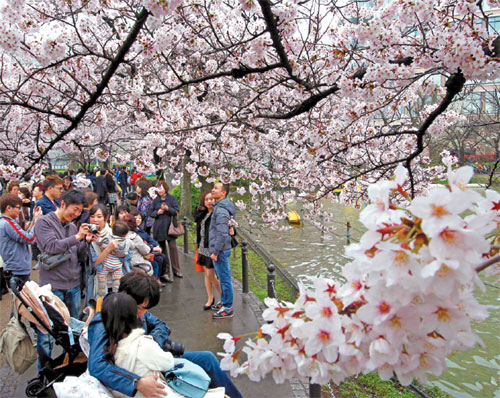Cherry blossom season 'bittersweet' time of life
By Xinhua in Tokyo (China Daily) Updated: 2016-04-05 08:13|
People enjoy cherry blossom viewing at Ueno Park in Tokyo, on Sunday. Japan's iconic flower draws thousands of individuals from all over the country every year. Shizuo Kambayashi / Associated Press |
The iconic flower sparks reflection but also an excuse for bad behavior
Scores of locals and tourists alike are flocking to Japan's parks, riverbanks and famous gardens to view the fleeting cherry blossoms (known in Japanese as Sakura) that maintain their resplendent whitish-pink full-bloom sometimes for as briefly as a couple of days depending on the capricious weather at this time of year.
A gusty day, or a downpour of rain, as the ephemeral emergence of the pretty little florets herald the end of winter and the beginning of spring, can swiftly see the dainty petals stripped from trees and scattered mercilessly below their branches on the grass or concrete below, the latter creating a melancholic juxtaposition as nature's fragility briefly blends and brightens colorless roads, pavements and walkways.
As many revelers in the country's capital enjoy Hanami (cherry blossom viewing), with the festivities often involving copious amounts of alcohol and food consumed while sitting under the radiant blooms, this time of year is profoundly more solitary and a time for deep, lugubrious contemplation.
"The buds begin to bloom and everyone gets excited, then the petals emerge and people make plans to get together with friends and have a good time, and while the blossoms are in full bloom the scenes can be absolutely breathtaking," said Shinichi Tanaka, 49, who said he worked for an "irrelevant company, doing meaningless and menial tasks day in and day out," somewhat morosely.
Glass half full
"But in the blink of an eye, they (Sakura) are gone. It's a metaphor for life. Everything is in a constant state of transience and flux. There are no constants and one day, with little or no warning, it will all be over," said Tanaka, half to himself, adding that this time of year is Japan's most "bittersweet season."
But while there are those who seem to derive some hard-to-understand enjoyment in the moody metaphors attached to Sakura, others flip the script and see the glass as half full, rather than half empty.
"We Japanese can all intuitively sense the spirit of 'wabi sabi' in things that surround us that are at once mysterious and beautiful. The aesthetic or viewpoint of 'wabi sabi' holds the idea of imperfection, impermanence, and incompletion as being intrinsically beautiful," explained Koji Yanai, 34, who described himself as a "hopeless poet and romantic" moonlighting as a sales clerk.
"It's less about winter ending and more about the fact that summer's coming and we can go to the beach again, hang out in a la carte cafes, actually we can hang out on the streets again in general, but most importantly it's about this!" exclaimed Shizuoka, 22, opting to use, or perhaps only just being able to remember, her first name, as she thrust a large can of pink grapefruit-flavored Chu-hai in the air, the size of the can seeming impossibly large considering the youngster's petite statue.
"Sake!" She shouted. "Alcohol-u!" she repeated in Japanese-English. "Let's drinking together!" She demanded nonsensically, her junior high school English grammar lessons apparently long-since forgotten, as her friend, Eriko, briskly replaced the can of booze with a bottle of Evian water, seemingly unbeknown to her inebriated friend, who went on to down the bottle of H2O as if her life depended on it.
While the likes of Shizuoka perhaps need little excuse to have a party, others find the whole ordeal something of an annual chore and wish Hanami didn't come with so many obligations.
Separate celebrations
"I have to go to separate work parties with colleagues from three different departments in my office, and one department is mostly guys who get horribly drunk and act obnoxiously, which I hate," lamented Hisako Kurita. "That's three parties, where I'm forced to drink with people I, quite frankly, dislike," she added. "I don't even get paid overtime," the 25-year-old office worker complained.
Her preference would be to "go home and sleep", she said.
"Don't get me wrong, the cherry blossoms themselves are absolutely beautiful, it's the people that spoil them," she said, nodding toward her colleague who had ducked behind a tree, presumably to relieve himself. "I'm staying home next year," she said.







